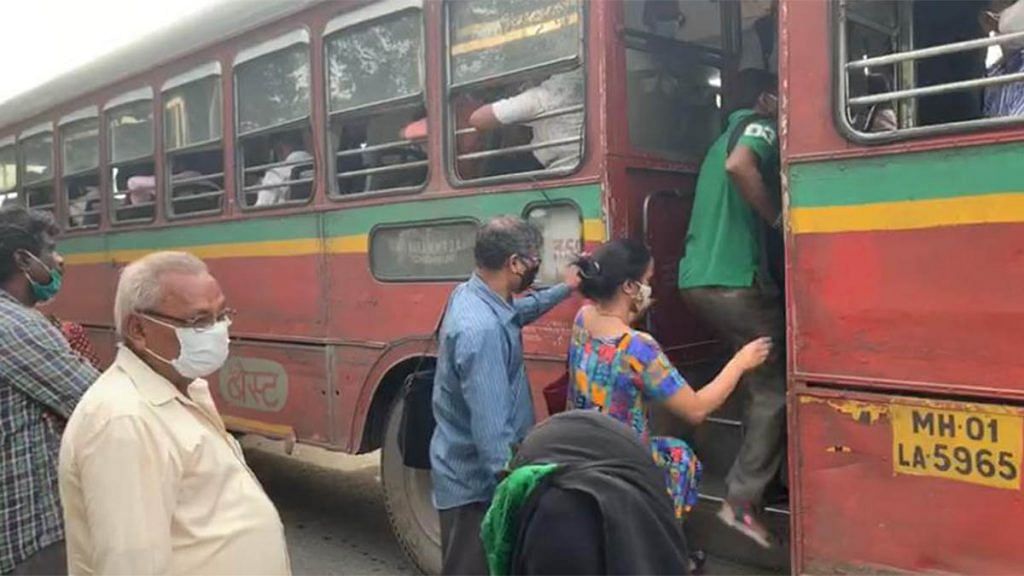Mumbai: Thomas John, who works as a manager in a housing society in Mumbai, spends nearly eight hours commuting to work and back every day.
John used to earlier ride the local train from Nerul to Sion with one change in between, and cover the journey in two hours. But with suburban railway services now limited only to essential service providers with Mumbai being a Covid-19 hotspot, John is compelled to take the public bus.
“My work doesn’t fall under essential services,” John told ThePrint. “Earlier, I used to reach home within an hour, now it takes me four hours. If I leave at 5 pm, I reach home only by 9 pm. Travelling to work has become an ordeal.”
With life gradually limping back to normalcy in Covid-hit Mumbai and many stepping out for work, the absence of the city’s famed local trains, its lifeline, is causing much inconvenience to commuters.
Suburban railway services, in which 75 lakh people in Mumbai depend on for their daily travel, were suspended in March after the nation-wide lockdown was imposed.
The Central and Western railways resumed select local train services in Mumbai from 15 June. Only people rendering essential services, however, are allowed to take these trains.
This even as the Maha Vikas Aghadi (MVA) government in Maharashtra has gradually been permitting more people to step out for work under its ‘Mission Begin Again’.
According to the latest directive, since 2 September, government offices in Mumbai have been allowed to function with 100 per cent attendance for Group A and Group B staffers, and 30 per cent for other employees.
The Chief Minister Uddhav Thackeray-led government has also allowed private offices to function with 30 per cent strength. Those in the informal sector such as domestic help, drivers, electricians, carpenters and so on have also been permitted to step out for work.
However, with Mumbai having always been a city where commuters have to travel long distances from far-flung suburbs and the city’s satellite towns to get to work, the lack of local train services is causing commuters grave hardships.
Initially only medical staff, including those working in private and government hospitals, police personnel, Mantralaya employees and civic body employees were deemed as essential workers who were allowed to use the local trains. Over a period of time, however, the state government asked railway authorities to also allow employees of nationalised banks, 10 per cent employees of private banks who will have to get prior QR codes from the government, as well as aircraft repair and maintenance staff.
Also read: How Aaditya Thackeray’s using Covid downtime to prep Maharashtra as post-pandemic tourist hub
‘Buses always run full, travel much costlier’
Salimbhai, who works as a daily wager in Mumbai and has to travel to any part of the city where there’s work, said he could cover short distances within 15-20 minutes by the local train. “I have to travel wherever there’s work — Sion, Bandra, Santacruz, Andheri. I used to travel by train and it would take me just 15-20 mins to cover short distances,” he told ThePrint. “The same travel by bus takes up to an hour. I have to wait a lot for a relatively empty bus, or spend from my pocket and take a taxi.”
Currently, services of the Brihanmumbai Electric Supply & Transport (BEST) undertaking are the only mass-transit public transport options for commuters.
The BEST undertaking resumed services in June but with norms for social distancing. Only 30 passengers are permitted in a bus, including five who can stand. The normal sitting capacity of a BEST bus is generally 54. Pre-Covid too, Mumbai’s BEST bus service was catering to 30 lakh passengers a day. Now, with the additional strain of regular rail commuters and limited capacity due to social distancing norms, BEST bus services are overburdened.
Ganesh Jadhav, who works as a caregiver for an 89-year-old ailing woman, said, “It takes me two hours to reach my workplace in the morning. While heading home in the evening, I have to first wait at the bus stop for 2-2.5 hours. Some buses don’t even halt at the bus stop. After I get a bus, there’s a lot of traffic. The commute by train was much better. The government should restart local train services.”
With bus tickets costlier than railway train tickets, people are also having to spend more on their commute. John, for instance, said he used to spend Rs 500 a month on a train season pass. “Now, I am spending Rs 4,500-5,000 a month. I have to wait for a bus for 1.5 hours, and then change midway to another bus route,” he said.
Govt hesitant to start train operations for all
There is a growing clamour from passenger groups as well as opposition political parties to get Mumbai’s local trains to resume services for all.
Leaders of the Raj Thackeray-led Maharashtra Navnirman Sena boarded the local train services running for essential service workers, defying government rules as a sign of protest to demand that local trains be started for all commuters.
Bharatiya Janata Party (BJP) MP Manoj Kotak also raised the issue in Parliament last week.
There have also been protests by commuters living in Mumbai’s satellite towns such as Virar and Nalasopara.
With Mumbai still seeing a daily spike in Covid cases, the state government is hesitant to take a call on starting train services for all commuters.
Earlier this week, the day MNS leaders protested, Transport Minister Anil Parab told reporters, “We are unlocking in phases. If we start trains for all and there is crowding as usual, the infection can spread rapidly even if 3-4 people in the compartment are Covid positive.”
Mumbai has so far recorded 1,94,177 Covid positive cases. Of these, 28,273 are currently active.
Also read: Covid hotspot Mumbai spent poorly on health in last 3 years, NGO report says
